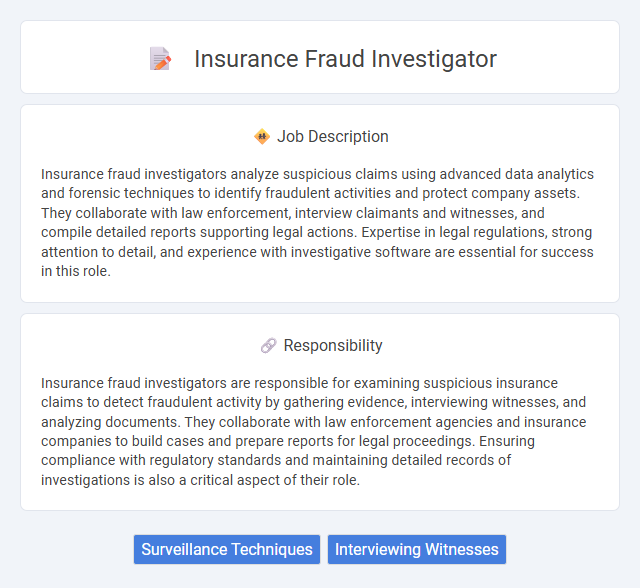
Insurance fraud investigators analyze suspicious claims using advanced data analytics and forensic techniques to identify fraudulent activities and protect company assets. They collaborate with law enforcement, interview claimants and witnesses, and compile detailed reports supporting legal actions. Expertise in legal regulations, strong attention to detail, and experience with investigative software are essential for success in this role.
Individuals with strong analytical skills, attention to detail, and high ethical standards are likely well-suited for the role of an insurance fraud investigator. People who are comfortable conducting thorough investigations, handling sensitive information, and working under pressure may find this job fitting to their capabilities. Candidates who lack patience for detailed scrutiny or struggle with ethical dilemmas might face challenges in excelling in this field.
Qualification
Insurance fraud investigators require a background in criminology, law enforcement, or accounting, with many employers preferring candidates who hold a bachelor's degree in these fields. Strong analytical skills and proficiency in data analysis software are essential for detecting suspicious claims and gathering evidence. Certifications such as Certified Fraud Examiner (CFE) enhance credibility and demonstrate specialized knowledge critical for successful fraud investigation.
Responsibility
Insurance fraud investigators are responsible for examining suspicious insurance claims to detect fraudulent activity by gathering evidence, interviewing witnesses, and analyzing documents. They collaborate with law enforcement agencies and insurance companies to build cases and prepare reports for legal proceedings. Ensuring compliance with regulatory standards and maintaining detailed records of investigations is also a critical aspect of their role.
Benefit
Insurance fraud investigators likely provide significant benefits to insurance companies by identifying fraudulent claims, which helps reduce financial losses. Their work probably deters fraudulent activities, leading to more accurate claim assessments and lower premiums for honest policyholders. Effective investigation of fraud cases may ultimately contribute to the overall stability and trustworthiness of the insurance industry.
Challenge
Insurance fraud investigators likely face complex challenges in detecting deceptive claims due to sophisticated techniques used by fraudsters. The role probably demands keen analytical skills and persistence to uncover hidden evidence and verify the authenticity of claims. Navigating legal and ethical boundaries while compiling accurate reports might also present ongoing difficulties in this profession.
Career Advancement
Insurance fraud investigators can advance their careers by gaining specialized certifications such as Certified Fraud Examiner (CFE) or pursuing advanced degrees in criminal justice or forensic accounting. Opportunities for promotion include senior investigator roles, management positions, and specialized units focusing on complex fraud schemes or cyber insurance fraud. Developing expertise in data analytics and legal compliance enhances prospects for leadership roles and cross-industry consultancy.
Key Terms
Surveillance Techniques
Insurance fraud investigators employ advanced surveillance techniques such as GPS tracking, covert video recording, and stakeouts to monitor suspects and gather critical evidence. Utilizing digital forensics and data analytics enhances the ability to detect inconsistencies in claims and identify fraudulent activities effectively. Mastery of these surveillance methods significantly boosts case resolution rates and supports legal prosecution of insurance fraud.
Interviewing Witnesses
Insurance fraud investigators specialize in interviewing witnesses to collect accurate and detailed testimonies that support case verification and claim validation. They employ advanced questioning techniques to detect inconsistencies, analyze body language, and gather critical information that strengthens fraud detection. By meticulously documenting witness statements, investigators build reliable evidence crucial for legal proceedings and insurance recovery efforts.
 kuljobs.com
kuljobs.com